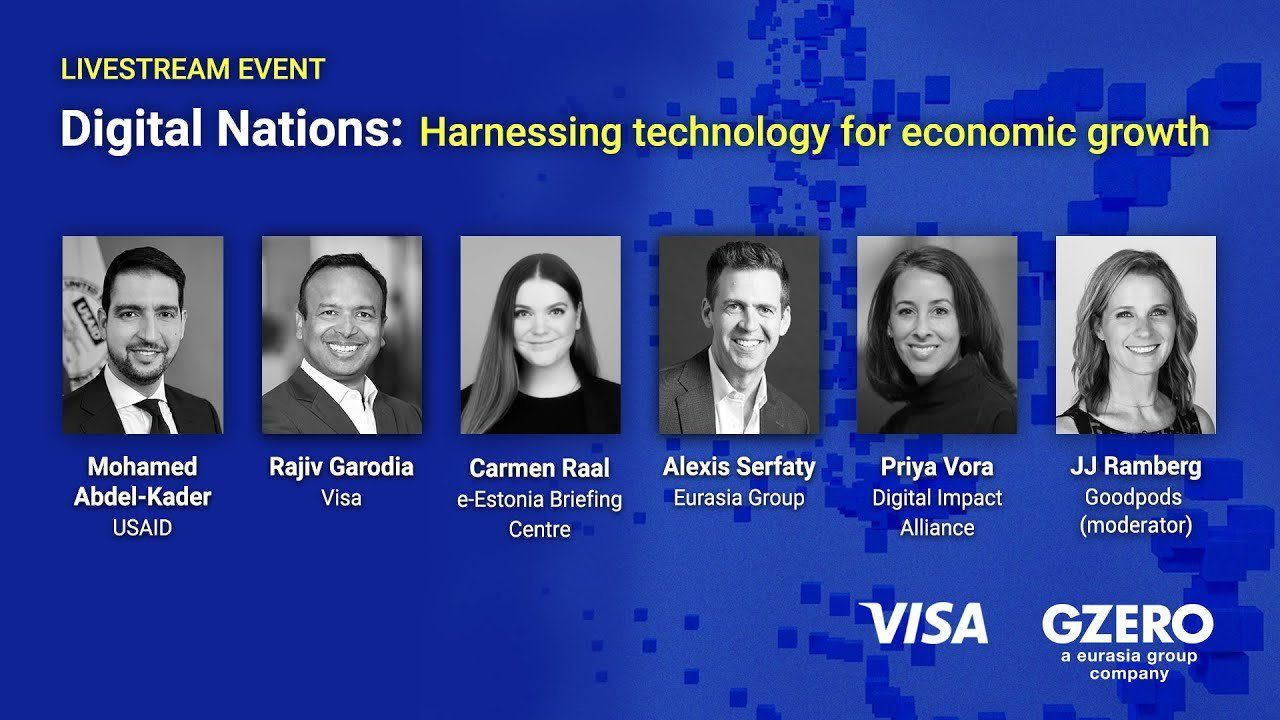
The threat of the Russian bear has been putting its neighbors on edge for years, and while plenty has been spent on beefing up their militaries, there’s now a whole other line of defense: digitization. Kyiv has harnessed its digital technology to provide government services to a whopping 19 million Ukrainians, despite daily bombings and devastation.
How has digitization helped Ukraine navigate first a pandemic and now a war? What lessons can be learned by other countries? GZERO asked geotech experts in a livestream event, presented by Visa, about the challenges and opportunities that nation-states face when it comes to digitization, and how it could shape a more inclusive and resilient future. The event was moderated by Goodpods' JJ Ramberg. Watch the full discussion above.
In 2020, Ukraine launched Diia, a mobile application that connects Ukrainians to more than 120 government services – from digital driver’s licenses to business filings to tax payments, says Mohamed Abdel-Kader, who helms the Innovation, Technology, and Research Hub at USAID. He and his teams help countries adopt new technological innovations in effective ways. Since the war, the app – also forged in partnership with UK Aid, Eurasia Foundation, and private sector partners – has also helped address wartime needs. For example, it has helped Ukrainians claim benefits for war-related property damage, and, at times, has been used to broadcast news and video when other networks are down. It has also helped with Ukraine’s mobilization and enabled the reporting of Russian troop sightings.
Unsurprisingly, it was another former Soviet republic, Estonia, that emerged as a pioneer in digitization back in the 2000s. Being so close to that Russian bear – it’s just a three-hour drive from St. Petersburg to the Estonian border town of Narva – helped focus the digital mind. The country was already a digital leader, but in 2007, Estonia withstood a month-long cyberattack that crippled its government systems and digital infrastructure. There was speculation of Russian involvement, but it was a “blessing in disguise,” says Carmen Raal, a digital transformation adviser at e-Estonia, the country’s electronic government services. This is because it forced the country to focus on cybersecurity before it was of critical importance to private and public sectors. The resulting innovations, she adds, have made Estonia a world leader in cyber security.
Today, Estonia offers 99.99% of its services online, Raal says, including universal online banking solutions and super-quick business setups. It takes “less than three hours to establish a company and, of course, it can be done fully online,” she adds.
What’s more, Estonia offers something called e-Residency, enabling individuals from anywhere in the world to apply online for a digital identity with which they can establish businesses in Estonia. “We have over 100,000 e-residents, and they have established over 27,000 Estonian companies,” Raal texted me after the event.
When it comes to digitization, both Ukraine and Estonia offer models of early investment, evolution, responses to security crises, and government-citizen relations, while the Estonian services reflect how governments can help residents (near and far) embrace economic opportunity. But globally, there remains plenty of work to ensure access, equality, and trust.
Digitization, after all, is great for those in the game, but as the rich get richer, governments need to ensure everyone has access. Last year, 60% of global GDP was generated by digitally enabled businesses, and in the last five years, the world has added two billion new internet users.
As the trend of digitalizing continues, with technology transforming businesses and work, says Eurasia Group's Geotechnology Director Alexis Serfaty, “it’s absolutely going to create new opportunities and new wealth, especially, I think, in emerging markets with younger populations and with more robust digital public infrastructure." In other words, there has been record growth in access, but there are still 2.5 billion people worldwide who are not online, and better systems and expanded access could translate into exponential growth – if done well.
Expanding trust in digital systems is also essential – only 62% of those GZERO surveyed before the livestream said they had faith in tech companies protecting their data.
Challenges of building secure public infrastructure that expands participation in inclusive ways, says Priya Vora, CEO of Digital Impact Alliance, are universal, and there’s a lot more work to be done. “I don’t think any country has figured it out yet,” she says.
Digital accessibility and digitization of services, along with digital skills, government oversight, and user trust need to grow in tandem to foster greater economic growth.
Hitting the right balance of government oversight will be key to getting this all right, says Rajiv Garodia, Visa’s global head of government solutions, who works with governments around the globe on digitization. He calls for a sound economic model and infrastructures designed with operational resilience, along with clear roles and responsibilities laid out for both the public and private sectors.
Global crises, like the ongoing war in Ukraine, also present opportunities for innovation and growth. Despite its current plight, Kyiv is making strides in a key sector that’s only becoming more important.
Watch the video above to hear the experts discuss the power of digitization – both amid war and for public and private sector growth.